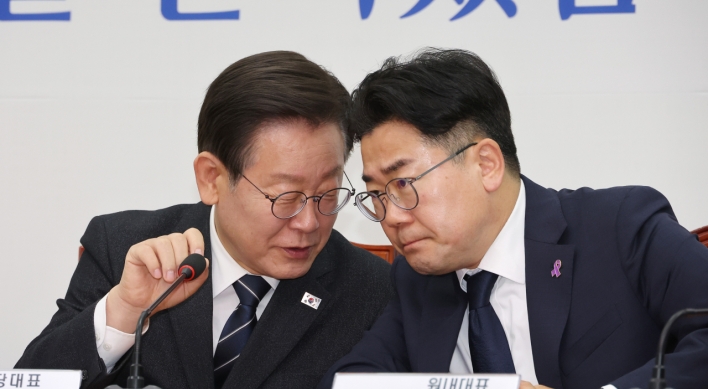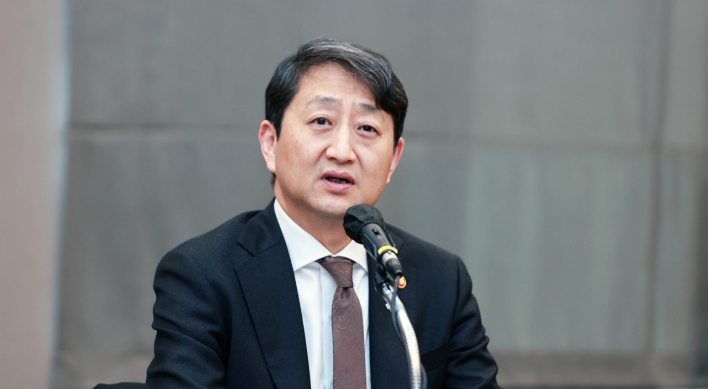[Editorial] Talks on sex slavery
Japan should address grievances of victims
By Korea HeraldPublished : April 18, 2014 - 21:13
Korea and Japan have resumed the diplomatic dialogue that had been suspended following Japanese Prime Minister Shinzo Abe’s visit to the Yasukuni Shrine in December.
Diplomats from the two countries met in Seoul on Wednesday to discuss the Japanese imperial army’s coercion of Korean women into sexual slavery during World War II.
The meeting, held between the director generals for Northeast Asian affairs from Seoul and Tokyo, was meaningful as it represented the first official talks between the two countries on the sexual enslavement issue.
At the inaugural meeting, the two sides simply reaffirmed their official stances. Korea has long demanded that the Japanese government take responsibility for forcing Korean women to serve as sexual slaves, apologize for the atrocities and compensate the victims for their suffering.
Thus far, Tokyo has even refused to hold talks on the matter, saying that the 1965 Treaty on Basic Relations between Japan and Korea resolved all its liabilities stemming from its colonial rule of Korea.
It remains to be seen what proposals Tokyo would present to address the grievances of the 55 surviving South Korean victims.
The two sides agreed to hold talks on a regular basis, slating their next meeting for May in Tokyo. They also agreed to keep details of their negotiations under wraps to avoid being influenced by public opinion.
From the next meeting, however, the agenda will include not just the comfort women issue but other pending problems between the two countries.
The talks signal that the two neighbors have started to move toward warming their icy relations. If the director general-level dialogue proceeds smoothly, the two sides will likely resume contacts at higher levels, including the strategic dialogue at the vice ministerial level.
Yet they have a long way to go to normalize their frayed ties. In the first place, Japanese politicians should create a favorable environment for talks by stopping provocative activities.
Early next week, the Yasukuni Shrine holds its spring festival. If Abe and other Japanese leaders are serious about improving ties with Korea, they should refrain from visiting the shrine en masse.
The key to repairing bilateral relations is resolving the sexual slavery issue once and for all. President Park Geun-hye has made it clear that Seoul-Tokyo ties can not improve unless Japan addresses the grievances of the Korean victims.
Last month, Abe reaffirmed that he would respect the Kono Statement, the Japanese government’s 1993 apology for forceful mobilization of Korean women as sexual slaves.
Now, he needs to go further to acknowledge the Japanese government’s legal responsibility for the comfort women issue and make amends for its wrongdoings.
Diplomats from the two countries met in Seoul on Wednesday to discuss the Japanese imperial army’s coercion of Korean women into sexual slavery during World War II.
The meeting, held between the director generals for Northeast Asian affairs from Seoul and Tokyo, was meaningful as it represented the first official talks between the two countries on the sexual enslavement issue.
At the inaugural meeting, the two sides simply reaffirmed their official stances. Korea has long demanded that the Japanese government take responsibility for forcing Korean women to serve as sexual slaves, apologize for the atrocities and compensate the victims for their suffering.
Thus far, Tokyo has even refused to hold talks on the matter, saying that the 1965 Treaty on Basic Relations between Japan and Korea resolved all its liabilities stemming from its colonial rule of Korea.
It remains to be seen what proposals Tokyo would present to address the grievances of the 55 surviving South Korean victims.
The two sides agreed to hold talks on a regular basis, slating their next meeting for May in Tokyo. They also agreed to keep details of their negotiations under wraps to avoid being influenced by public opinion.
From the next meeting, however, the agenda will include not just the comfort women issue but other pending problems between the two countries.
The talks signal that the two neighbors have started to move toward warming their icy relations. If the director general-level dialogue proceeds smoothly, the two sides will likely resume contacts at higher levels, including the strategic dialogue at the vice ministerial level.
Yet they have a long way to go to normalize their frayed ties. In the first place, Japanese politicians should create a favorable environment for talks by stopping provocative activities.
Early next week, the Yasukuni Shrine holds its spring festival. If Abe and other Japanese leaders are serious about improving ties with Korea, they should refrain from visiting the shrine en masse.
The key to repairing bilateral relations is resolving the sexual slavery issue once and for all. President Park Geun-hye has made it clear that Seoul-Tokyo ties can not improve unless Japan addresses the grievances of the Korean victims.
Last month, Abe reaffirmed that he would respect the Kono Statement, the Japanese government’s 1993 apology for forceful mobilization of Korean women as sexual slaves.
Now, he needs to go further to acknowledge the Japanese government’s legal responsibility for the comfort women issue and make amends for its wrongdoings.
-
Articles by Korea Herald










![[KH Explains] Can tech firms' AI alliances take on Nvidia?](http://res.heraldm.com/phpwas/restmb_idxmake.php?idx=644&simg=/content/image/2024/05/07/20240507050619_0.jpg&u=)








